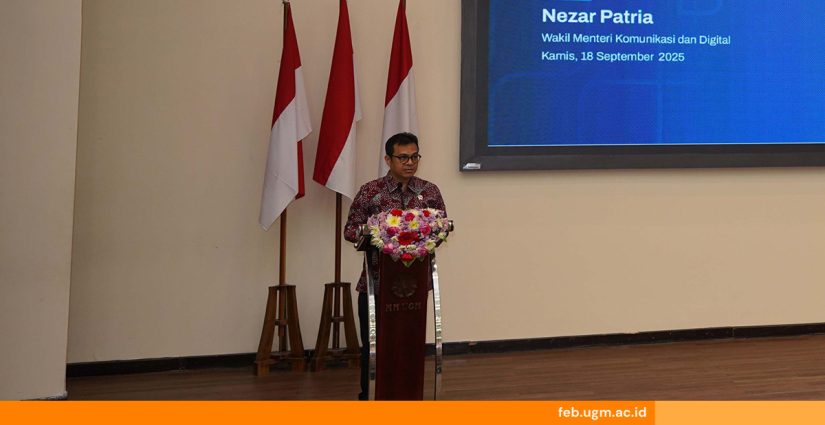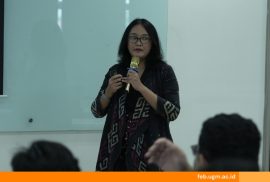
The Deputy Minister of Communication and Digital Affairs of the Republic of Indonesia, Mr. Nezar Patria, S.Fil., M.Sc., M.B.A., emphasized the importance of optimizing big data in regional government governance to accelerate digital transformation.
“The use of big data enables significant leaps in the public sector by offering accuracy and speed, thereby accelerating public services,” he explained on Thursday (18/9/2025) at the MM FEB UGM Auditorium.
As the keynote speaker at the National Seminar and the Gadjah Mada Digital Transformation Governance Index (GM-DTGI) Awarding for District/City Regional Governments 2025, Nezar stated that the use of data from open sources increases transparency and accountability, thus strengthening public trust. Using big data in the public sector improves public services by connecting with advanced technology and transforming how governments work.
However, Nezar acknowledged various challenges in utilizing big data in the public sector. These challenges include data governance and regulatory issues, data readiness, and limited access.
“Government connectivity has now reached 97% of inhabited areas. It means internet access is already available across Indonesia under various conditions. Of course, there are still gaps in internet speed and service quality,” he elaborated.
Therefore, it is crucial to build mutual trust in managing data, strengthen compliance with technical and legal aspects, and ensure goal alignment. Equally important is improving data quality by involving communities in research projects addressing real issues and collecting data through broad and open networks.
Nezar further explained strategies to optimize the use of big data. The first step is to establish a vision based on concrete use cases, focusing on real-scale cases that are relevant and replicable, and ensuring that the chosen cases address broad needs. The next step is to understand the existing data landscape for transparency, conduct mapping of needs, availability, and data location, and build a structured data catalog.
On the infrastructure side, it is essential to ensure the availability of data infrastructure to support interoperability and data exchange for various needs. Moreover, data infrastructure should follow standards, have controlled access management, and guarantee security. Equally important is encouraging rapid adoption through data labs—agile experimental units for experimentation and testing to detect problems early.
Nezar also revealed that through the Ministry of Communication and Digital Affairs, the government is currently developing programs to advance digital government technology, including providing government digital infrastructure and digital government applications such as SP4N-LAPOR and the Digital Public Service Mall. In addition, the ministry supports regional governments through various initiatives, such as strengthening the role of local communication and information offices, innovative city programs, technical governance training, and digitalization acceleration clinics for local governments.
To promote digital transformation in regional governments, the Center for Information Systems Studies of the Faculty of Economics and Business, Universitas Gadjah Mada (PKSI FEB UGM) developed the Gadjah Mada Digital Transformation Governance Index (GM-DTGI). This innovative index, launched in 2024, assesses the digital transformation performance of district/city governments. The instrument evaluated the implementation of the Electronic-Based Government System (SPBE) and other digital innovations adopted by regional governments across Indonesia, focusing on seven key pillars. These pillars are: Governance and Leadership; Regulations and Policies; Public Administration Reform and Change Management; Data Governance; Digital Ecosystem; User-Centered Platform Design; and Cybersecurity and System Resilience. In 2025, the index evaluated 508 regional governments across Indonesia through a data-based assessment process verified directly with the respective governments.
Reporter: Kurnia Ekaptiningrum
Sustainable Development Goals









